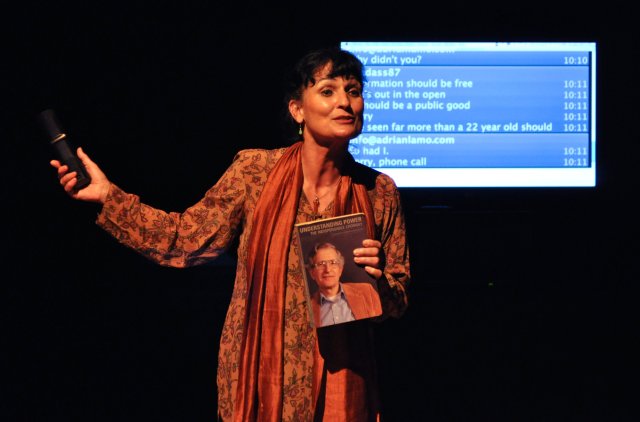
Sydney-based performing arts company Kinetic Energy Theatre Company turned 40 this year.
It is a miraculous achievement to survive in a dog-eat-dog world. Our consumer society is ruled by commercialisation and profit-making. The powers that be would rather feed cultural atrophy and political amnesia than cultivate intelligent artistic endeavours for the health and vibrancy of the people.
Despite the obstacles, the Company has performed its work in the capital cities and regions of all states and territories in Australia (except WA and NT), as well as in Britain, the Netherlands, the US and Indonesia.
It has consistently reached out to the general public and ttargeted communities, and has served diverse education environments with their art and expertise.
Throughout its long lifetime, the Company's work has been achieved with little or no government funding. Theatre critic Brian Hoad from The Bulletin once described Kinetic's co-directors Graham Jones and myself as “True national treasures of the performing arts”.
He wrote: “All bureaucratic arty farties at the Australia Council should attend at least a couple of the current cycles at The Edge. They may learn something about life as well as art.”
The Company celebrated the occasion late September with a two-week season of theatre, music and film at its base in Enmore. In the first week, the Company of nine actors presented its acclaimed music theatre piece Home.
Set in Sydney, in the now, the play paints a multi-dimensional perspective on the complex question of urban homelessness. It cries out against the widening gap between the rich and the poor - and debunks the myth of Australian egalitarianism and equal opportunity.
A host of colourful characters - all based on real life people whom the writers befriended during an intensive period of fieldwork and research - tell their stories of defiance and resistance and - despite their often dire circumstances - of kindness, vitality and love.
The second week started with a retrospective program of images and signature pieces, illuminate, in which they showed a selection of excerpts from their vast body of work.
Some of these were performed live, others were on film. They were strung together by stories and images spanning 40 years.
They finished the season with a one day Kinetic Jazz event, “Tune In”, which featured four bands: Divergence, AustraLYSIS, The Polymorphic Orkestra, and The Kinetic Jazz Orchestra.
Kinetic Energy Dance Company was founded by Graham Jones in 1975, driven by his desire to express a mature contemporary artistic voice in a still young and culturally-cringing post-colonial Australia.
He found inspiration in uniquely Australian stories, ranging from the world of early explorers to the Dreamtime, from sport to jazz, from east-west connections to exile and disorientation, and everything else in between.
The Company opened the Seymour Centre with a performance of contemporary dance at the York Theatre. They were resident there from 1975, until they moved to Liverpool Street in 1977 to establish the first contemporary dance warehouse studio in Sydney.
There the Company ran classes, rehearsed, created, and presented informal performances. Public seasons were held at venues like the Chapter House at St Andrews Cathedral, the Performance Space and the Opera House.
From 1978, the Company mounted an annual tour to Brisbane, Sydney, Melbourne and Adelaide, and to regional country centres.
From 1985, the Company had two co-directors. Our vision was to have a home from which to build a team of skilled inter-disciplinary performers devoted to ongoing training, research and creation. And to share this home and explorative energy with like-minded artists in search of “cultural activism”.
Forced out of the inner city by the big developers, we found an old ballroom in Newtown. We turned it into the EDGE Performance Laboratory (now called the King Street Theatre).
We began creating our radical body of work, taking on (then mostly taboo) subjects like mental health, death and dying, gender struggles and patriarchal power structures in society and religion.
We launched an annual program of performance seasons at The EDGE, continuing collaborations with guest artists, touring, and educational work and apprenticeship schemes.
We also initiated lively exchanges within the wider arts community, most notably through the multicultural “One With At Least Another” projects, “Dance on the Edge” series and the “Jazz on the Edge” program. We made our unique open space venue available and accessible to the community as a meeting place and a haven for low-budget contemporary performance.
After a year's hiatus due to illness, we relocated the Company to St Luke's Hall in Enmore in 2002 to rise from the ashes.
Never shy of controversial topics, a gradual shift was made towards political and social justice issues, using the art of theatre more and more as a tool for radical cultural activism.
We developed an experimental theatre-in-education project Village Space, which tackles social justice issues such as climate change, poverty, homelessness, refugees and Indigenous rights. It is a highly acclaimed program serving schools, universities and the wider community with entertaining and pertinent human rights education.
The co-directors' love affair with jazz and poetry continued with the birth of Kinetic Jazz, supporting Sydney's live music scene with a channel for new sound and improvisation.
Kinetic Energy's 2016 program will include three social justice plays (The Freedom Ride, Refuge and Home), as well as a series of Kinetic Jazz events.
And, in praise and honour of the courageous whistleblowers in this world, next year will also the return of the powerful critique of capitalism: Empire.
[For more on Kinetic Energy's work and history, visit www.kineticenergytheatre.org.]
Like the article? Subscribe to Green Left now! You can also like us on Facebook and follow us on Twitter.